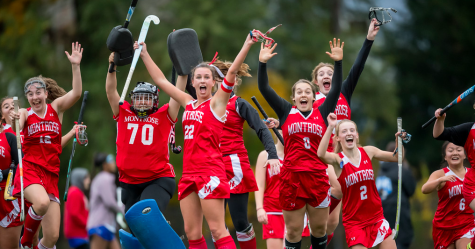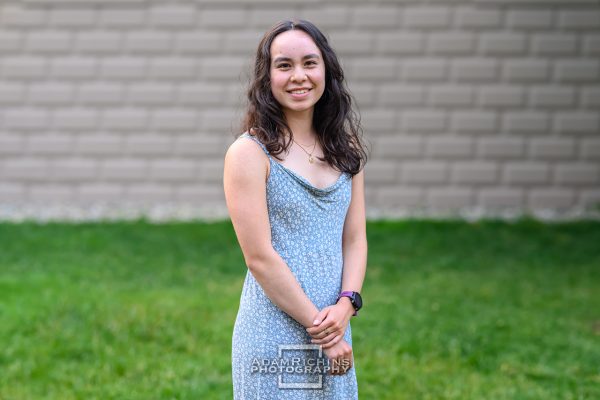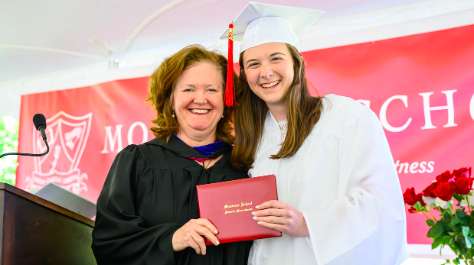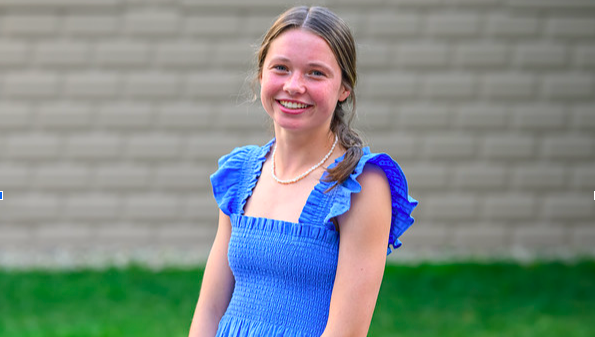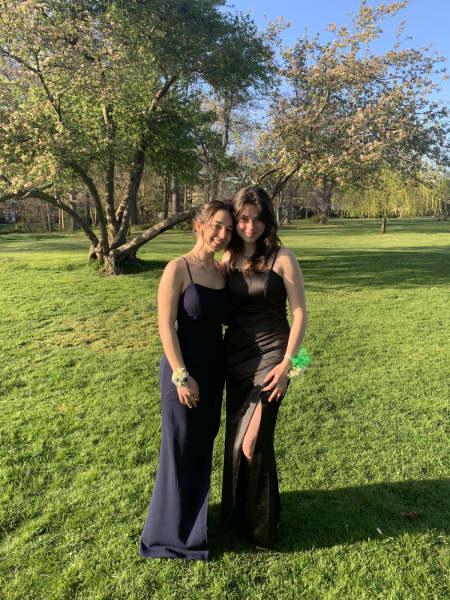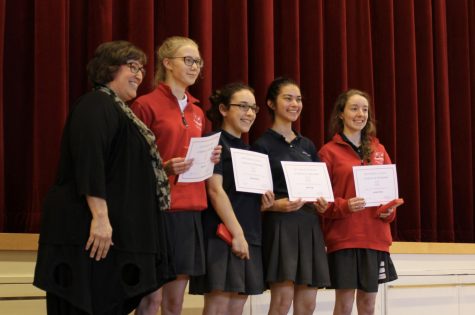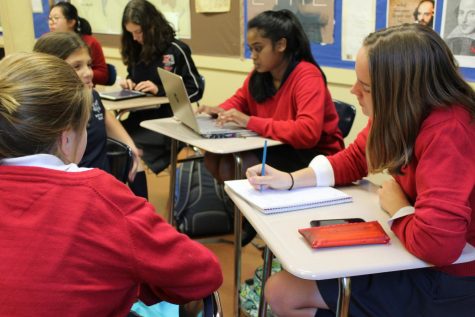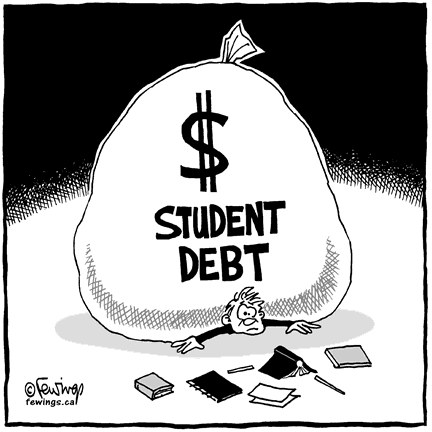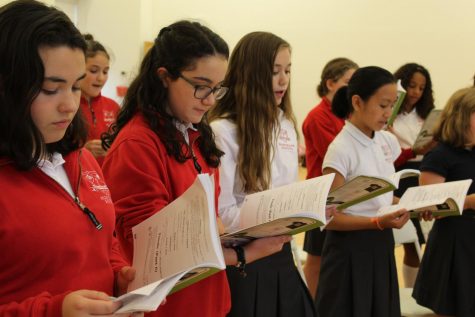This Year’s Commencement Speaker
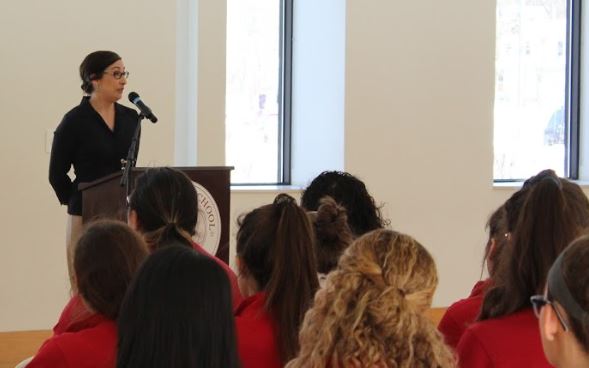
Dr. Peerzada speaks to Montrosians in the M&M Building, February 2019
In our previous post, we featured Valedictorian Caroline Churney’s graduation speech that she delivered earlier this month. The Montrose community also had the privilege to hear from this year’s commencement speaker, Dr. Jehanna Peerzada ’86, parent of Julie Baker ’23. In the spring, Dr. Peerzada visited the M&M Building to talk to students about her career experience in medicine. At graduation, she inspired the class of 2019 with the many lessons she has learned over the years. Dr. Peerzada reminded us that following our dreams does not always mean that we will walk upon a clear, straight path. Rather, we will find ourselves in the many loops and turns along the way. Her advice was very fitting for the occasion, and the class of 2019 will surely keep her words in their back pockets for the future.
Below you can find Dr. Peerzada’s speech:
Good morning! Welcome to the class of 2019, your fellow students, and to everyone else—the people who have helped you, loved you, and guided you along your way.
It feels a bit crazy for me to say “the class of 2019” because I was in the class of 1986 at Montrose, which feels like forever ago and, let’s be honest, really was forever ago.
I went to Montrose when it was only a few years old. Dr. Detore was Head of School when it started and we were in Brookline in an old college building which was a tad run down. You know that bathroom you have next to the cafeteria? The raise the paddle bathroom? Basically the whole school looked like that bathroom.
We had Father Dick as our chaplain, which made up for a lot. And we had smart, dedicated teachers. We made friendships that have lasted to this day. And right at the beginning, Montrose had this amazing ability, with very little money but the elbow grease and vision of many parents and teachers, to be scrubbed into a classy and elegant place. When I came to tour Montrose with my 5th grade daughter a few years ago, I wasn’t sure what to expect. I had been living in a different state for many years, so had not seen your new school.
I was happy to see that the vision of the school is still clear and strong, and that it has improved in so many ways without losing the personal warmth of the early days. I will tell you that you—Montrose students—were an impressive bunch to watch at the Open Houses and visiting days. We looked at many other schools, but I was struck by your poise, your ability to look me in the eye, to be confident and articulate. And watching the students in the upper classes in particular, I said to myself: ‘Yes, that’s how I’d like my daughter to speak and act when she gets older; this is the kind of thinking I hope she’ll be able to do before she heads off into adulthood. I hope she likes this place best.” And she did, so I am going to take this moment to thank you personally for that.
When I was in your place, I didn’t realize that graduating from high school and moving on to college was the last time when I’d make the same basic life transition as all of my peers and friends. It’s true that in high school, you have some choices in the classes that you take and the things you do in your free time. But as you start college, your options really explode and you can find yourself having entirely different experiences than your friends at the same college, let alone friends studying elsewhere.
One friend who loved Greek and Latin worked at an archeological dig in Greece and is an archeologist today.
I spent my first two years taking the pre-med track, learning to speak Russian and spent at term in what was then Leningrad.
One roommate was drawn into the music scene, played guitar at coffee houses on campus, now designs soundtracks for Disney movies.
The range of choices is ridiculously exciting….and yet sometimes it can be a little scary. Because at the same time that you are trying to explore and try new things, there can be a mounting pressure to have your life plan figured out.
In college, I felt that I had a bunch of random interests: Russian, premed, philosophy (my major), a job in the theater and another one as a tutor in the writing center. As I neared the end of college, going to med school didn’t seemed possible or even interesting. I didn’t know one thing about being a doctor. There were people in premed who had known since the crib that they wanted to be surgeons; they had a determination and focus I couldn’t really imagine at that point. The only experience I had doing anything medical was kind of an accident, actually:
It was in the summer before my senior year. Inspired by what another student had done, I went to work for Mother Theresa in Calcutta. My plan was to work in her orphanage each day, which I did at first. She wasn’t in the city that summer, until the end. But, I felt that the sisters at the orphanage didn’t really need my help. And it turned out that across the street from the hostel where I stayed, an English doctor had set up a clinic on the sidewalk to take care of the thousands of people who lived on the street, many of whom had leprosy.
So, after about a month, I just crossed the street in the morning and worked in doctor jack’s clinic instead. There, I learned what it felt like to be a doctor, not really in terms of the actual job, because there are light years between that job and what I do now—-THERE, scraping skin off someone’s feet on a filthy street and HERE managing asthma in a clean and modern hospital.
What I learned, though, was how it felt to have an incredibly vulnerable person really trust ME, a complete stranger. And I realized that my motivation to help shouldn’t come from a place of pity but from a desire to deserve their trust. Dr. Jack really modeled this, and so did the Sisters of Charity. Mother Theresa was trying to love people whom the world considers unlovable. She was helping them because she saw a dignity in them not because she felt sorry for them.
Going back for my senior year in college, I still didn’t have a coherent life plan. I lined up a summer teaching intern job at a boarding school. While everyone else seemed to have moved on to grad school or jobs or maybe an adventure backpacking through Europe, I was…a bit adrift.
There were two people who eventually made everything different. And I am going to tell you about them for a reason that I’ll explain in a minute.
The director of the writing center where I had worked at Dartmouth asked if I would to return in the fall to be an assistant teacher in an English course. And she assigned me to a Professor Don Sheehan—-an older professor of poetry and English literature. He also happened to be a recent convert to Russian Orthodoxy, had a long white beard and little round glasses, looked like Tolstoy. My job was to attend his class, read the books, and give each student feedback on their papers.
The thing about Don Sheehan is that he was brilliant, incredibly peaceful, and wise. He had the kind of peace and humility that comes from hours of prayer. We met before each class and talked about the Brothers Karamazov and sometimes Don asked me how I thought he should teach the class that day. Which was really nice of him because I was 22.
Don recognized that I was pretty lost, not just in terms of career but also personally, that I was doubting myself and feeling really isolated. So, in an empty space, Don had a profound effect on my life. He taught me how to be a teacher. He nurtured my faith and my confidence at a really low point. In his presence, I felt completely known and seen, the way a really humble and holy person can see, yet also completely accepted and loved at the same time—-they way I imagine that God loves. That’s how it was with Don. That was a crucial year of growing.
After that year, I applied for a position teaching science at Oakcrest, your sister school in DC and decided to take it. A salary! Finally!
But I couldn’t afford to live on my own in DC. I found an ad on the message board of a nearby college and ended up living in the home of Doctor Katherine Bain, who told me to call her Kitty. She actually gave me free room and board in exchange for walking her dog and making dinner a couple times a week.
When I moved in, I assumed that Kitty was newly retired: she was very active, had tons of friends, all of her own teeth, no grey hair. She was super sharp (my mother said it was because she never married or had kids). She was in perfect shape except for one bad hip, so she had trouble walking the dog. I found out after a couple of weeks that kitty was 94 years old.
She was born in 1897, went to college in 1917, and was the only woman in her medical school class. She couldn’t get a residency for a few years because back then, the residents lived in the hospital, and they didn’t have quarters for women. Kitty was the first physician to have a non-segregated waiting room in DC. She did research on childhood diseases all over the world. The first award that C. Everett Koop gave as surgeon general in the 1980s was to her for medical service to the country. Of course she didn’t tell me that; I found out from her relatives.
Yet, Kitty wasn’t self conscious about doing this all of this as a woman. It never occurred to her that she couldn’t do any of these things, despite the fact that it was extraordinarily unusual for a woman to be doing them at all.
I taught at Oakcrest and lived with Kitty for two years. She said to me one day: “You come home from work, sit down on the front stairs and read my medical journals that come in the mail without even changing first. That’s just not normal. You should go to medical school.” And at that point, it was somehow the natural next step.
So I went to medical school and Kitty was delighted when I chose a pediatric residency and, yes, she was still alive.
Towards the end of residency, the opportunity came along to get research and bioethics training to study a question that came up frequently at the hospital, which was whether heroic efforts should be made to keep extremely preterm infants alive, and whose decision that should be. As you know, Montrose really encourages students to think deeply and take apart the layers of a problem. I felt really compelled to do that sort of thinking about decisions for premature infants.
So, in the end, the strands all came together. The philosophy and premed. And the teaching, which is a huge part of medicine.
Why am I telling you this?
First: Because as you go through college, I want you to feel ok about not having everything figured out. Borrowing from a speaker I heard recently describe her own meandering path from practice of law into a life in politics—-sometimes the shortest distance between two points is the long way around. You can only do what you are ready to do, and sometimes you need experience in order to become ready.
Right now, you do have the next step figured out, and that’s part of what we are celebrating today.
But some day you may not. The solution to not having your life plan figured out is to just….do the next thing.
Find the next job or experience that will help you grow. It doesn’t have to be the thing you want to do for the rest of your life. Just show up with your energy and attention, and—-this is the most important part—-do it well.
And that will lead you to the next thing…and the next. And every job or experience that you plan (or in my case accidentally back into) can teach you something important—-something specific, like how to use a software program, or something general, like how to understand people whose cultures and values are profoundly different from yours.
The second reason I am telling you my story is to show you the importance of mentors. Even those of you who are lucky enough to know what you want, the “surgeons from the crib’” among you, need mentorship to make the best decisions you can. I think that mentorship is crucial to finding your way in life (how could I not?)
The best mentors are usually not assigned or asked directly to be a mentor. It’s kind of an organic process, where you and another person, usually someone older but for sure with more experience and wisdom, you develop an affinity, a sense of shared goals and mutual respect. And the older/wiser person feels inclined to offer guidance, opportunities, crucial feedback, or even a little therapy, whatever it is.
You have heard from younger alumni that you are well prepared for college and life, that Montrose has taught you important skills like critical thinking, and it has. You have heard that your character formation and spiritual growth will be invaluable, and they will.
But you should know that Montrose is also very good at demonstrating mentorship and the power of genuine relationships. Your time here has been a journey steeped in this. Your teachers and advisors and coaches and priests care deeply about you. They are striving to live in the best way they can. And, they have taken the time to know you and to encourage the best in you. Some have acted as academic mentors and others have acted as spiritual mentors; some are both.
Just as important, you have been taught the qualities that make a person easy to mentor.
What are those? Showing up with all of your energy and attention. Being truly engaged in what you are doing. Being fully present. Montrose students actually know what that means. You are the kind of people who know how to look for meaning, to ask: why am I doing this? What is my purpose here? All of this has been such a big part of your time here.
And with that, I will end by saying:
We are all so happy and excited for you—we wish you the best and we—the whole Montrose community—are here for you—-always.
Congratulations!




